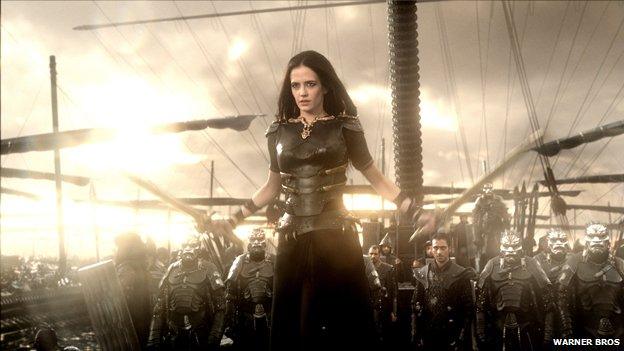300: Five historical errors in the new film
- Published

300- the cartoonish film retelling of the Spartans' defence of Thermopylae against a Persian horde - now has a sequel, 300: Rise of an Empire. How much of it plays fast and loose with the history, asks Paul Cartledge, professor of Greek culture at Cambridge University.
The first problem is the title. Which "Empire" is supposed to be on the rise here? The "Athenian Empire"? That didn't even begin to rise until at least two years after the events that the movie focuses on - the sea-battles of Artemisium and Salamis, both fought in 480 BC.
The movie gets under way with a wondrously unhistorical arrow. It is fired by Athenian hero Themistocles on the battlefield of Marathon near Athens in 490 BC, and it kills none other than Persian Great King Darius I, next to whom is standing son and successor Xerxes. Although Darius had launched the Persian expedition that came to grief at Marathon, he was not present there, nor was Xerxes.
From the Persians' Marathon defeat, which - historically - accounts for their revenge expedition under Xerxes, the scene shifts to the Persians' fleet a whole decade later. The fleet is under the command of a Greek woman - Queen Artemisia of Halicarnassus (modern Bodrum), played by Eva Green. Artemisia was real enough, we learn from Herodotus, her contemporary and historian of the Greco-Persian Wars. She was indeed a Greek queen, who did fight for the Persians at Salamis. But far from being admiral-in-chief of the Persian navy, she contributed a mere handful of warships out of the total of 600 or so.
The film-makers included one rather prolonged, explicit heterosexual sex scene. Utterly and completely fantastically it is between enemies Themistocles and Artemisia in the interim between the battles of Artemisium (presented as a Greek defeat - actually it was a draw) and Salamis. All in the name of diplomacy, naturally.
The crowning, climactic historical absurdity is the notion that in order for Themistocles and his Athenians to win at Salamis they needed the help of the massive Spartan navy which turns up just in the nick of time, commanded by another Greek queen, Gorgo (widow of Leonidas, the hero of 300), played by Lena Headey. Actually, Sparta contributed a mere 16 warships to the Greek fleet of some 400 ships at Salamis, and like Artemisia's they made absolutely no difference to the outcome, which was resoundingly and incontestably an Athenian victory.

Eva Green plays Queen Artemisia of Halicarnassus in the film
Follow @BBCNewsMagazine, external on Twitter and on Facebook, external